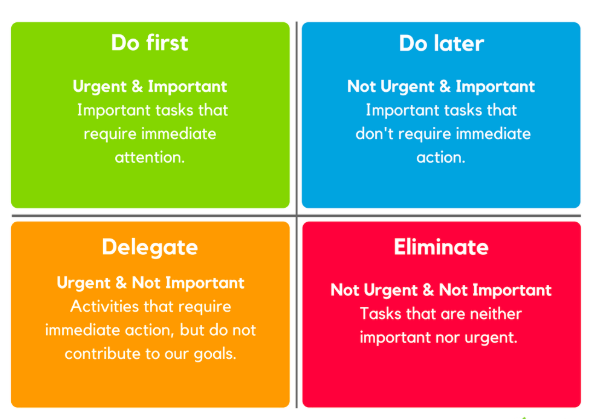I’ve never been good at doing certain type of things. This has been the case for as long as I can remember.
This belief of delaying/skipping things that felt ‘Unimportant’ became stronger when I stumbled upon this blog post by Paul Graham during my first job
PG talks about three types of procrastinations depending on what one does instead of not working on something
- Doing Nothing
- Doing Something Less Important
- Doing Something More Important
As you can imagine, unlike other cases, deciding to ‘Not Do Something’ or procrastinating in order to use that time to ‘Do something more important’ is actually ‘Good Procrastination’


That overwhelming feeling of a long list of errands that need your attention is pretty frequent for many of us. Errands come in all shapes & sizes and come from all directions. Also, they have an infinite supply. Which means, no matter how many of them you get off your list, there will always be more errands waiting for you once you reach home or start working on something important.
In case you are wondering what classifies as errands.
What’s “small stuff?” Roughly, work that has zero chance of being mentioned in your obituary. It’s hard to say at the time what will turn out to be your best work (will it be your magnum opus on Sumerian temple architecture, or the detective thriller you wrote under a pseudonym?), but there’s a whole class of tasks you can safely rule out: shaving, doing your laundry, cleaning the house, writing thank-you notes—anything that might be called an errand.
Good procrastination is avoiding errands to do real work.
While it may be crystal clear to you that the task at hand is an errand, to people who want you to do it won’t necessarily think like that. This, could be a source of some tension but then
‘You Gotta Not Do, What You Gotta Not Do’.
I try to think of errands from the lens of ‘The Eisenhower Matrix’

Types of Errands
- Urgent & Important
- Not Urgent & Important
- Urgent & Not Important
- Not Urgent & Not Important

Type 1: I try to make everyone around me (the errand creators) understand that we should try not to have any items from Type 1 (Urgent & Important). There should be almost no errands that demands my immediate attention. However, if any errand from Type 1 comes about, it has to be dealt with on priority.
Type 2: I try to bunch the important items together and schedule a suitable time to do them
Type 3: I try to delegate these (where I don’t need to be personally involved and it’s not important) to others or figure out if they can be done using technology
Type 4: I try to treat them as they don’t exist (Ignore). By doing this, such errands stop finding their way to me.
Errands are productivity killers and when left unchecked, grow surprisingly fast and tend to take all the time available.
Another, thing with errands is sometimes they can give you an illusion of getting some work done when in reality, a lot of that work amounts to nothing meaningful and won’t help you grow in any way.
I don’t know any successful person who isn’t a good procrastinator and doesn’t aggressively shield their time from errands. Maybe, this says something.
PS: Here’s a super long read by Tim Urban (Wait but why) on Procrastination

